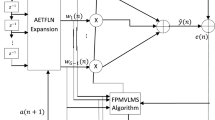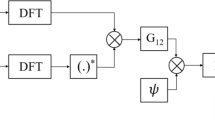Abstract
To utilize the full second-order statistical information of the complex-valued signal, a widely linear complex-valued LMM (WL-CLMM) algorithm is proposed by using different M-estimate functions. The proposed WL-CLMM algorithm can process both circular and noncircular complex-valued signals in impulsive noise environments. Moreover, a novel adaptive threshold adjustment method for the M-estimate function is designed according to the probability density function of the complex-valued error signal. In addition, to decrease the sensitivity of the input signal to the performance of the algorithm, the normalized version of WL-CLMM (WL-CNLMM) has been developed. Then, we carry out the mean behavior and mean square behavior analysis of the proposed algorithms. Simulation results show that the proposed algorithms outperform some existing complex-valued algorithms and the theoretical results are well matched.










Similar content being viewed by others
Data Availability
The data that support the finding of this study are available from the first author on request.
References
T. Adalı, P.J. Schreier, Optimization and estimation of complex-valued signals: theory and applications in filtering and blind source separation. IEEE Signal Process. Mag. 31(5), 112–128 (2014)
T. Adali, P.J. Schreier, L.L. Scharf, Complex-valued signal processing: the proper way to deal with impropriety. IEEE Trans. Signal Process. 59(11), 5101–5125 (2011)
B. Chen, L. Xing, H. Zhao, N. Zheng, J.C. Principe, Generalized correntropy for robust adaptive filtering. IEEE Trans. Signal Process. 64(13), 3376–3387 (2016)
P. Chevalier, A. Blin, Widely linear mvdr beamformers for the reception of an unknown signal corrupted by noncircular interferences. IEEE Trans. Signal Process. 55(11), 5323–5336 (2007)
Y.-R. Chien, Variable regularization affine projection sign algorithm in impulsive noisy environment. IEICE Trans. Fundam. Electron. Commun. Comput. Sci. 102(5), 725–728 (2019)
S.C. Douglas, D.P. Mandic, Performance analysis of the conventional complex LMS and augmented complex LMS algorithms, in: 2010 IEEE International Conference on Acoustics, Speech and Signal Processing, IEEE, 2010, pp. 3794–3797.
S.C. Douglas, Widely-linear recursive least-squares algorithm for adaptive beamforming, in: 2009 IEEE International Conference on Acoustics, Speech and Signal Processing. IEEE, 2009: 2041–2044.
S.L. Goh, D.P. Mandic, An augmented CRTRL for complex-valued recurrent neural networks. Neural Netw. 20, 1061–1066 (2007)
J.P. Guimarães, A.I. Fontes, J.B. Rego, A.D.M. Martins, J.C. Principe, Complex correntropy function: properties, and application to a channel equalization problem. Expert Syst. Appl. 107, 173–181 (2018)
J.J. Jeong, A robust affine projection algorithm against impulsive noise. IEEE Signal Process. Lett. 27, 1530–1534 (2020)
L. Li, H. Zhao, A robust total least mean m-estimate adaptive algorithm for impulsive noise suppression. IEEE Trans Circuits Syst. II Express Briefs. 67(4), 800–804 (2020)
W. Liu, P.P. Pokharel, J.C. Principe, Correntropy: properties and applications in non-Gaussian signal processing. IEEE Trans. Signal Process 55(11), 5286–5298 (2007)
D.P. Mandic, V.S.L. Goh, Complex valued nonlinear adaptive filters: noncircularity (Widely Linear and Neural Models. Wiley, New York, 2009)
D.P. Mandic, S. Javidi, S.L. Goh, A. Kuh, K. Aihara, Complex-valued prediction of wind profile using augmented complex statistics. Renew. Energy. 34, 196–201 (2009)
E.C. Menguc, N. Acir, Kurtosis-based CRTRL algorithms for fully connected recurrent neural networks. IEEE Trans. Neural Networks Learn. Syst. 29(12), 6123–6131 (2018)
E.C. Mengüç, N. Acır, An augmented complex-valued least-mean kurtosis algorithm for the filtering of noncircular signals. IEEE Trans. Signal Process. 66(2), 438–448 (2018)
E. Ollila, D.P. Palomar, F. Pascal, Shrinking the eigenvalues of m-estimators of covariance matrix. IEEE Trans. Signal Process. 69, 256–269 (2021)
B. Picinbono, P. Chevalier, Widely linear estimation with complex data. IEEE Trans. Signal Process. 43(8), 2030–2033 (1995)
G. Qian, S. Wang, Generalized complex correntropy: application to adaptive filtering of complex data. IEEE Access. 6, 19113–19120 (2018)
G. Qian, S. Wang, H.H.C. Iu, Maximum total complex correntropy for adaptive filter. IEEE Trans. Signal Process. 68, 978–989 (2020)
C. Safarian, T. Ogunfunmi, The quaternion minimum error entropy algorithm with fiducial point for nonlinear adaptive systems. Signal Process. 163, 188–200 (2019)
P. J. Schreier and L. L. Scharf, Statistical Signal Processing of Complex-Valued Data: The Theory of Improper and Noncircular Signals. Cambridge University Press, 2010.
L. Shi, H. Zhao, Y. Zakharov, B. Chen, Y. Yang, Variable step-size widely linear complex-valued affine projection algorithm and performance analysis. IEEE Trans. Signal Process. 68, 5940–5953 (2020)
L. Shi, H. Zhao, X. Zeng, Y. Yu, Variable step-size widely linear complex-valued NLMS algorithm and its performance analysis. Signal Process. 165, 1–6 (2019)
D. Slock, On the convergence behavior of the LMS and the normalized LMS algorithms. IEEE Trans. Signal Process. 41(9), 2811–2825 (1993)
Y.-M. Shi, L. Huang, C. Qian, H.-C. So, Shrinkage linear and widely linear complex-valued least mean squares algorithms for adaptive beamforming. IEEE Trans. Signal Process. 63(1), 119–131 (2015)
F. Wang, Y. He, S. Wang, B. Chen, Maximum total correntropy adaptive filtering against heavy-tailed noises. Signal Process. 141, 84–95 (2017)
Y. Xia, S.C. Douglas, D.P. Mandic, Adaptive frequency estimation in smart grid applications: Exploiting noncircularity and widely linear adaptive estimators. IEEE Signal Process. Mag. 29(5), 44–54 (2012)
Y. Xia, D.P. Mandic, Complementary mean square analysis of augmented CLMS for second-order noncircular Gaussian signals. IEEE Signal Process. Lett. 24(9), 1413–1417 (2017)
Y. Xia, D.P. Mandic, Widely linear adaptive frequency estimation of unbalanced three-phase power systems. IEEE Trans. Instrum. Meas. 61(1), 74–83 (2011)
Y. Xia, C.C. Took, D.P. Mandic, An augmented affine projection algorithm for the filtering of noncircular complex signals. Signal Process. 90(6), 1788–1799 (2010)
Y. Xie, Y. Li, Y. Gu, J. Cao, B. Chen, Fixed-point minimum error entropy with fiducial points. IEEE Trans. Signal Process. 68, 3824–3833 (2020)
D. Xu, H. Zhang, D.P. Mandic, Convergence analysis of an augmented algorithm for fully complex-valued neural networks. Neural Netw. 69, 44–50 (2015)
Y. Yu, H. He, B. Chen, J. Li, Y. Zhang, L. Lu, M-Estimate based normalized subband adaptive filter algorithm: performance analysis and improvements. IEEE/ACM Trans. Audio Speech Lang. Process. 28, 225–239 (2020)
Y. Yu, H. He, T. Yang, X. Wang, R.C. de Lamare, Diffusion normalized least mean M-Estimate algorithms: design and performance analysis. IEEE Trans. Signal Process. 68, 2199–2214 (2020)
S. Zhang, J. Zhang, W.X. Zheng, H.C. So, Widely linear complex-valued estimated-input LMS algorithm for bias-compensated adaptive filtering with noisy measurements. IEEE Trans. Signal Process. 67(13), 3592–3605 (2019)
Y. Zou, S.C. Chan, T.S. Ng, Least mean M-Estimate algorithms for robust adaptive filtering in impulse noise. IEEE Trans Circuits Syst II: Analog and Digital Signal Process. 47(12), 1564–1569 (2000)
Y. Zhou, S.C. Chan, K.L. Ho, New sequential partial-update least mean M-Estimate algorithms for robust adaptive system identification in impulsive noise. IEEE Trans. Ind. Electron. 58(9), 4455–4470 (2011)
Acknowledgements
The work was supported by the National Natural Science Foundation of China under Grants 62171303, China South Industries Group Corporation (Chengdu) Fire Control Technology Center Project (non-secret) under Grants HK20-03, and the National Key Research and Development Program Foundation of China under Grants 2018YFC0830300.
Author information
Authors and Affiliations
Corresponding author
Additional information
Publisher's Note
Springer Nature remains neutral with regard to jurisdictional claims in published maps and institutional affiliations.
Appendix
Appendix
In this Appendix, Wirtinger calculus is briefly described. Wirtinger calculus provides a framework for differentiating nonanalytic functions and it allows performing all the derivations in the complex domain, in a manner very similar to the real-valued case. For a complex-valued function \(f(z)\), where \(z = z_{r} + jz_{i}\), two generalized complex derivatives can be defined as
In fact, these generalized complex derivatives can be formally implemented by regarding \(f(z)\) as a bivariate function \(f(z,z^{*} )\) and treating \(z\) and \(z^{*}\) as independent variables. In other words, when applying \(\frac{\partial f}{{\partial z}}\), we take the derivative with respect to \(z\), while formally treating \(z^{*}\) as a constant. Similarly, \(z\) is formally treated as a constant when deriving \(\frac{\partial f}{{\partial z^{*} }}\). In particular, if \(\frac{\partial f}{{\partial z^{*} }} = 0\), the complex-valued function \(f(z)\) becomes complex derivative (analytic). So the Cauchy–Riemann equations can simply be stated as \(\frac{\partial f}{{\partial z^{*} }} = 0\). Moreover, Wirtinger calculus contains standard complex calculus as a special case. Finally, according to the rules of CR calculus, its chain rule can be summarized as
Rights and permissions
About this article
Cite this article
Li, L., Pu, YF. Widely Linear Complex-Valued Least Mean M-Estimate Algorithms: Design and Performance Analysis. Circuits Syst Signal Process 41, 5785–5806 (2022). https://doi.org/10.1007/s00034-022-02053-z
Received:
Revised:
Accepted:
Published:
Issue Date:
DOI: https://doi.org/10.1007/s00034-022-02053-z




